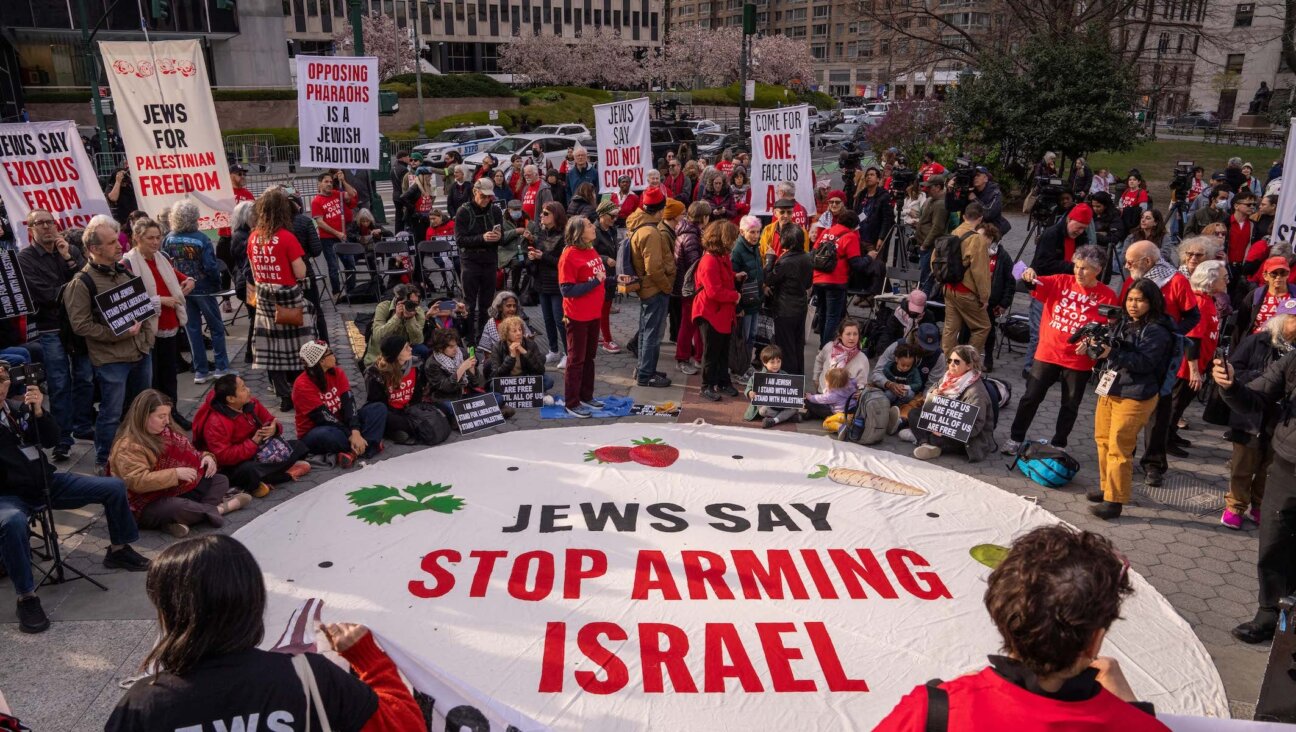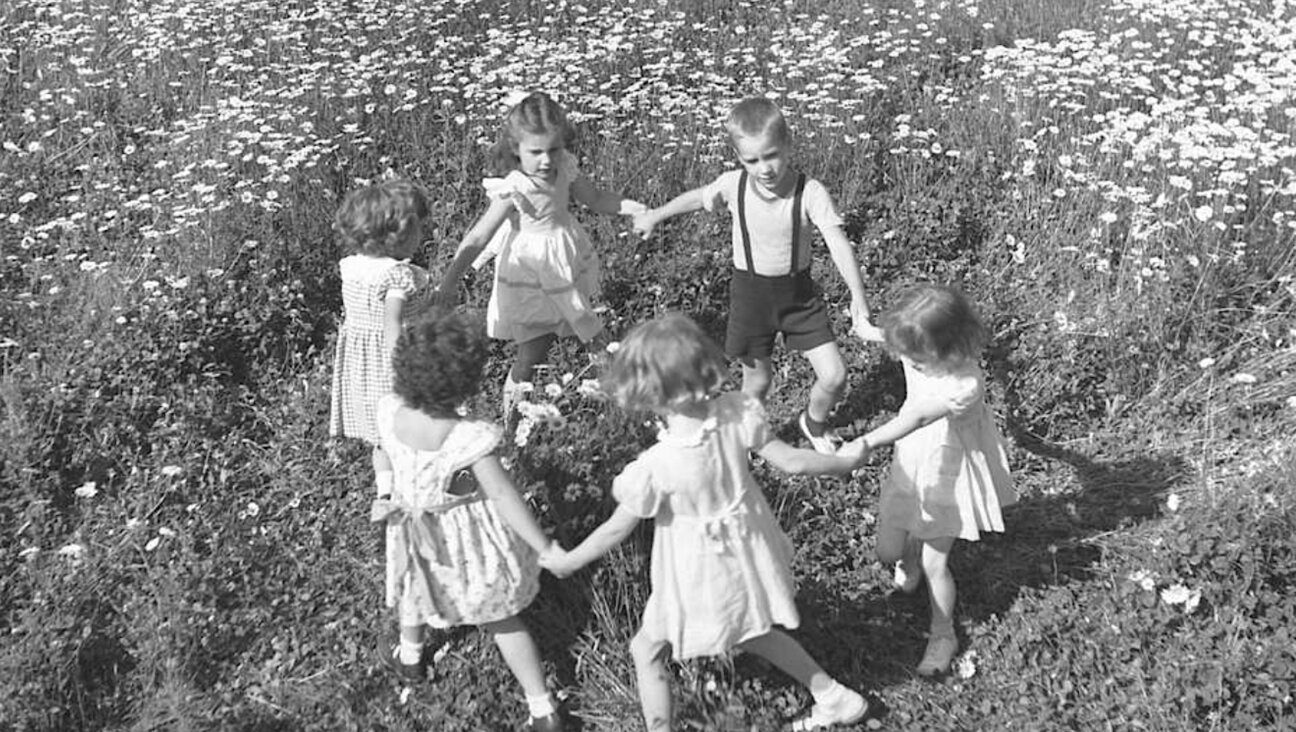A Ukrainian Jewish leader takes shelter as her husband fights the Russians

Graphic by Angelie Zaslavsky
Eugenia Noshenko spent Friday night huddled in her basement in Poltava, Ukraine, helping to comfort the two young children of a neighboring woman as all four of them listened to explosions from the war taking place overhead.
Two women, two children and a cat, in a dark room, waiting for dawn.
“Today we are back in the house, but yesterday we slept in the cellar,” she told J. in a phone interview Saturday conducted in Russian. “We hear explosions all around Poltava. We are praying for Kyiv — the city is in a very difficult position.”
Noshenko, 39, is the leader of Poltava’s small Progressive (Reform) community, which has been supported by Congregation Beth Am in Los Altos Hills, Calif. for more than 20 years. Noshenko stepped in when the previous community head made aliyah to Israel last year, and now she leads Friday night services and runs holiday celebrations for the small, isolated congregation.
The congregation used to be larger, says Beth Am’s Cherie Half, chair of the Poltava-Odessa Committee. But Poltava, a city of 280,000 in central Ukraine, situated on the main road between Kharkiv and Kyiv, has been a kind of way station for Jews who have been moving out of the Russian-controlled separatist regions in the east.
“There’s a lot of transition, eastern Ukrainian Jews coming to Poltava and then going to Israel,” says Half. That makes it hard to keep the community going — many of the young people grow up with a Jewish education and then head to Israel, Noshenko’s 19-year-old daughter among them.
Poltava has been spared the brunt of the Russian invasion so far, although heavy fighting has been taking place all around it, including attacks in Mirgorod, some 30 miles to the west. As of Saturday night, Kyiv remains in Ukrainian hands, but heavy fighting is taking place in the streets and a massive Russian tank buildup has been observed near the border of Kharkiv, readying for another push toward the Ukrainian capital. The Ukrainian government has handed out weapons to civilians and is teaching people how to make Molotov cocktails; more than 120,000 Ukrainians have already poured across the country’s western border into neighboring countries.
Noshenko said that Poltava is under nighttime curfew from 5 p.m. to 8 a.m. She uses her daylight hours to try and buy food for herself and her congregation. “We can go out to get food, but it’s not recommended,” she told J. “But we have to buy food for the old people who can’t go themselves.” It’s not easy to find necessities, however — “the shelves are empty,” she wrote in an email.
Half said Beth Am has been trying to send money to the Poltava congregation, as well as to another, much larger Reform congregation in Odessa that her shul began supporting three years ago.
“We have been collecting money, but can’t get it to them,” she said. “There’s no way to send money through the usual channels.”
Ukraine’s banks and government agencies have been hit by cyberattacks beginning more than a week ago. While Russia has not taken responsibility, experts acknowledge that hackers carry out such attacks with the tacit blessing of the Russian government.
As a result, it’s nearly impossible for Ukrainian citizens to access cash. “The banks are closed, the ATMs aren’t working,” Noshenko reported. While credit cards are being accepted, Noshenko is used to paying with cash — cash that is no longer available.
“My daughter is in Israel, in the Israeli army, and my husband is fighting [the Russians] somewhere, I don’t know where,” Noshenko said. “I’m taking care of these two children because I have a private home [not an apartment], and my husband built a shelter in the basement in case of such emergencies.”

Noshenko gets ready to deliver emergency food supplies to homebound elderly in Poltava, Ukraine, Feb. 26, 2022. Courtesy of JWeekly.com
Speaking to J. from Israel, Noshenko’s daughter said she is terribly worried for her parents and friends back in Ukraine. “I’ve lived there my whole life,” she said, adding that she immigrated to Israel a year and a half ago after being very active in Poltava’s Jewish community. “We celebrated Shabbat and all the holidays, I went to Jewish camp, I went on an Israel program, and now I’m in the army,” she said. Her grandfather and a cousin live in Ashdod, so that is her home base.
“I was really scared when I couldn’t get through to my father,” she told J. “He wasn’t answering my texts. But we were able to talk recently, and he’s OK.
“Poltava is safer than Kyiv and other regions. I hope it will stay that way. My mother has food, water, shelter. She’s on the internet all the time, keeping track of what’s going on.”
Noshenko, asked what American Jews can do to help, started with a sigh. “Unfortunately, I don’t know,” she said. Because of the money transfer problems, there’s nothing concrete she can think to ask for.
“We are so grateful for the moral support,” she said. “We know that we are not alone. The whole world is supporting us. We are all praying for this to end.”
This article originally appeared in Jweekly.com. Reposted with permission.
















